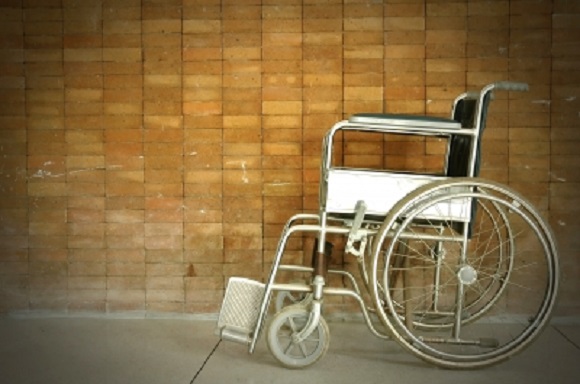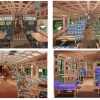
One major Japanese TV station calls out another’s use of disabled people in so-called “inspiration porn”.
When I still lived in the US, I remember a time I was watching a program on the Public Broadcasting Service featuring a group of middle school-aged kids working to design a fin or flipper to fit one of the girls in the group that would best allow her to swim through water. The girl testing out the flipper designs in the pool happened to be in a wheelchair, unable to walk.
A Japanese friend who was watching the program with me remarked that you would likely never see a program on TV in Japan featuring a disabled person yet not focusing on the person’s disability. He stated he didn’t like the way television in Japan always portrayed people with disabilities, and wished they would feature them in programs like the one we were watching, where their disability wasn’t even mentioned.
At the time I thought it was an interesting observation, and as it turns out, it’s a sentiment shared by many others.
Recently, a program called Bari-Bara on Japanese broadcasting network NHK’s Educational TV revealed the results of a poll asking people what they thought of “inspirational programs featuring disabled people”.
https://twitter.com/metro_reisen/status/769839296995995648The response of non-disabled people polled was split nearly down the middle, with 45 percent reporting that they enjoy such programs. Still, the greater half – with 55 percent – reported that they don’t like such inspirational programs. When asking people in the disabled community what they thought about such programs, 90 percent of those polled answered they don’t like them.
The program Bari-Bara touts itself as “Japan’s first variety show for disabled people”, and aims to create a “truly barrier-free society”. The title Bari-Bara actually stands for “barrier-free variety” (bariaa-furii baraetii), the term “barrier-free” meaning to be accessible, or free of barriers/impediments. The episode in question, which featured the polls regarding inspirational programs about the disabled community, also showed a talk by the late Australian comedian and disabled rights activist Stella Young in which she coined the term “inspiration porn”, referring to society’s habit of always turning disabled people into “inspirations” simply because they live with a disability.
In addition, the episode also showed a behind-the-scenes making of a so-called “namida choudai” (literally: tears, please) documentary, in which the staff purposely twist the truth to make for a more emotional and tear-jerking story. Take for example, the conversation between the filming crew and the girl lying in bed in the video below (starting around 1:20):
Staff: Wow, that must be so tough.
Girl: No, no, it’s actually not at all.
Staff: Nah, let’s go with “yeah, it’s tough”.
Girl: Um…
And in the following scene:
Staff: That must’ve been a huge shock right?
Girl: No. But there was a really hot doctor at that hospital, so that was really exciting.
Staff: We don’t need that part of the story.
Girl: …
On its own the episode relays an important and thought-provoking message, but this episode also happened to air on the last weekend of August, the same weekend that Nippon Television runs its annual 24-Hour Television telethon, a charity program whose aim is to “introduce existing conditions of social welfare in Japan as well as around the world and to present the need for assistance for disadvantaged people.” According to their website, since the first campaign in 1978, the charity committee has raised 27,248,414,171 yen (US$267,685,968) in donations as of 2008. However, the program is also infamous for showing the very “tears, please” documentaries and “inspiration porn” that Bari-Bara denounces. In fact, the whole Bari-Bara episode was a parodied mock-up of 24-Hour Television‘s program, with staff and crew wearing shirts in the same bright yellow color that 24-Hour Television uses, bearing a similar slogan and with the stage decorated in a similar fashion to that of the telethon event.
▼ From 24-Hour Television
https://twitter.com/ktun29109/status/769896998296166400Considering the much-needed donations 24-Hour Television raises for a whole variety of charitable organizations, it’s highly unlikely that Bari-Bara‘s intent was to completely undermine the telethon, but hopefully it has encouraged the committee as well as the program’s viewers to rethink the way they portray and view disabled people in society. And if the result of Bari-Bara‘s poll is any indication, the tear-jerking documentaries aren’t even appealing to the majority of the population, so a new way of presenting the telethon could even be beneficial to its ultimate purpose.
Source: My Game News Flash
References: Wikipedia (1, 2), 24-Hour Television
Top image: FreeDigitalPhotos/anankkml

 Japanese charity telethon 24-Hour Television faces criticism for poor spending and low popularity
Japanese charity telethon 24-Hour Television faces criticism for poor spending and low popularity Monster girl brothel anime gets kicked off of yet another Japanese TV station
Monster girl brothel anime gets kicked off of yet another Japanese TV station Monster girl brothel anime finally makes a friend as it finds new broadcast partner in Japan
Monster girl brothel anime finally makes a friend as it finds new broadcast partner in Japan Former Uniqlo employee starts clothing alterations service for people with disabilities
Former Uniqlo employee starts clothing alterations service for people with disabilities Social experiment puts public to the test in “Do Singaporeans have a heart?”【Video】
Social experiment puts public to the test in “Do Singaporeans have a heart?”【Video】 Red light district sushi restaurant in Tokyo shows us just how wrong we were about it
Red light district sushi restaurant in Tokyo shows us just how wrong we were about it Japanese ramen restaurants under pressure from new yen banknotes
Japanese ramen restaurants under pressure from new yen banknotes Tokyo Tsukiji fish market site to be redeveloped with 50,000-seat stadium, hotel, shopping center
Tokyo Tsukiji fish market site to be redeveloped with 50,000-seat stadium, hotel, shopping center Starbucks Japan adds a Motto Frappuccino to the menu for a limited time
Starbucks Japan adds a Motto Frappuccino to the menu for a limited time Beautiful Red and Blue Star luxury trains set to be Japan’s new Hokkaido travel stars
Beautiful Red and Blue Star luxury trains set to be Japan’s new Hokkaido travel stars Akihabara pop-up shop sells goods made by Japanese prison inmates
Akihabara pop-up shop sells goods made by Japanese prison inmates McDonald’s new Happy Meals offer up cute and practical Sanrio lifestyle goods
McDonald’s new Happy Meals offer up cute and practical Sanrio lifestyle goods Sandwiches fit for a sumo served up in Osaka【Taste Test】
Sandwiches fit for a sumo served up in Osaka【Taste Test】 Sakura tree falls on man at Sannenzaka near Kiyomizu temple in Kyoto 【Breaking News】
Sakura tree falls on man at Sannenzaka near Kiyomizu temple in Kyoto 【Breaking News】 New private rooms on Tokaido Shinkansen change the way we travel from Tokyo to Kyoto
New private rooms on Tokaido Shinkansen change the way we travel from Tokyo to Kyoto All-you-can-drink Starbucks and amazing views part of Tokyo’s new 170 meter-high sky lounge
All-you-can-drink Starbucks and amazing views part of Tokyo’s new 170 meter-high sky lounge More foreign tourists than ever before in history visited Japan last month
More foreign tourists than ever before in history visited Japan last month French Fries Bread in Tokyo’s Shibuya becomes a hit on social media
French Fries Bread in Tokyo’s Shibuya becomes a hit on social media Studio Ghibli releases new action figures featuring Nausicaä of the Valley of the Wind characters
Studio Ghibli releases new action figures featuring Nausicaä of the Valley of the Wind characters Starbucks reopens at Shibuya Scramble Crossing with new look and design concept
Starbucks reopens at Shibuya Scramble Crossing with new look and design concept Studio Ghibli glasses cases let anime characters keep an eye on your spectacles
Studio Ghibli glasses cases let anime characters keep an eye on your spectacles Beautiful Ghibli sealing wax kits let you create accessories and elegant letter decorations【Pics】
Beautiful Ghibli sealing wax kits let you create accessories and elegant letter decorations【Pics】 Studio Ghibli releases Kiki’s Delivery Service chocolate cake pouches in Japan
Studio Ghibli releases Kiki’s Delivery Service chocolate cake pouches in Japan New definition of “Japanese whiskey” goes into effect to prevent fakes from fooling overseas buyers
New definition of “Japanese whiskey” goes into effect to prevent fakes from fooling overseas buyers Our Japanese reporter visits Costco in the U.S., finds super American and very Japanese things
Our Japanese reporter visits Costco in the U.S., finds super American and very Japanese things Studio Ghibli unveils Mother’s Day gift set that captures the love in My Neighbour Totoro
Studio Ghibli unveils Mother’s Day gift set that captures the love in My Neighbour Totoro New Japanese KitKat flavour stars Sanrio characters, including Hello Kitty
New Japanese KitKat flavour stars Sanrio characters, including Hello Kitty New Pokémon cakes let you eat your way through Pikachu and all the Eevee evolutions
New Pokémon cakes let you eat your way through Pikachu and all the Eevee evolutions Disney princesses get official manga makeovers for Manga Princess Cafe opening in Tokyo
Disney princesses get official manga makeovers for Manga Princess Cafe opening in Tokyo Sales of Japan’s most convenient train ticket/shopping payment cards suspended indefinitely
Sales of Japan’s most convenient train ticket/shopping payment cards suspended indefinitely Sold-out Studio Ghibli desktop humidifiers are back so Totoro can help you through the dry season
Sold-out Studio Ghibli desktop humidifiers are back so Totoro can help you through the dry season Japanese government to make first change to romanization spelling rules since the 1950s
Japanese government to make first change to romanization spelling rules since the 1950s Ghibli founders Toshio Suzuki and Hayao Miyazaki contribute to Japanese whisky Totoro label design
Ghibli founders Toshio Suzuki and Hayao Miyazaki contribute to Japanese whisky Totoro label design Doraemon found buried at sea as scene from 1993 anime becomes real life【Photos】
Doraemon found buried at sea as scene from 1993 anime becomes real life【Photos】 Tokyo’s most famous Starbucks is closed
Tokyo’s most famous Starbucks is closed One Piece characters’ nationalities revealed, but fans have mixed opinions
One Piece characters’ nationalities revealed, but fans have mixed opinions We asked a Uniqlo employee what four things we should buy and their suggestions didn’t disappoint
We asked a Uniqlo employee what four things we should buy and their suggestions didn’t disappoint Princesses, fruits, and blacksmiths: Study reveals the 30 most unusual family names in Japan
Princesses, fruits, and blacksmiths: Study reveals the 30 most unusual family names in Japan Japan elects its first openly transgender man to public office
Japan elects its first openly transgender man to public office Grilled & chilled sweet potatoes from vending machines a hit in southern Japan
Grilled & chilled sweet potatoes from vending machines a hit in southern Japan Media watchdog BPO said some surprising things about monster brothel anime Interspecies Reviewers
Media watchdog BPO said some surprising things about monster brothel anime Interspecies Reviewers Ready for a dose of feels? Grab the tissues because this daughter’s love is beautiful【Video】
Ready for a dose of feels? Grab the tissues because this daughter’s love is beautiful【Video】 Japanese wrestler Saori Yoshida smashes Guinness World Record by bursting balloons with her butt
Japanese wrestler Saori Yoshida smashes Guinness World Record by bursting balloons with her butt Beautiful when she’s angry? TV series features model yelling at the camera, and nothing else
Beautiful when she’s angry? TV series features model yelling at the camera, and nothing else Pokémon anime officially on hiatus due to COVID-19, will only play reruns starting next week
Pokémon anime officially on hiatus due to COVID-19, will only play reruns starting next week Mass stabbing in Japan leaves 19 dead and dozens injured
Mass stabbing in Japan leaves 19 dead and dozens injured Yo-kai watch what the western Yo-kai Watch doesn’t want you to yo-kai watch
Yo-kai watch what the western Yo-kai Watch doesn’t want you to yo-kai watch New silent cafe opens in Japan, where talking and music is not allowed
New silent cafe opens in Japan, where talking and music is not allowed Pyeongchang Olympics group wipes Japan off the map
Pyeongchang Olympics group wipes Japan off the map Japanese TV show about women sprinting up hills and panting adds its first-ever male performers
Japanese TV show about women sprinting up hills and panting adds its first-ever male performers Cats and cosplay gravure models are the focus of number-one cosplayer Enako’s new TV show【Photos】
Cats and cosplay gravure models are the focus of number-one cosplayer Enako’s new TV show【Photos】 Terrace House season cancelled, removed from streaming service after Hana Kimura’s death
Terrace House season cancelled, removed from streaming service after Hana Kimura’s death
Leave a Reply